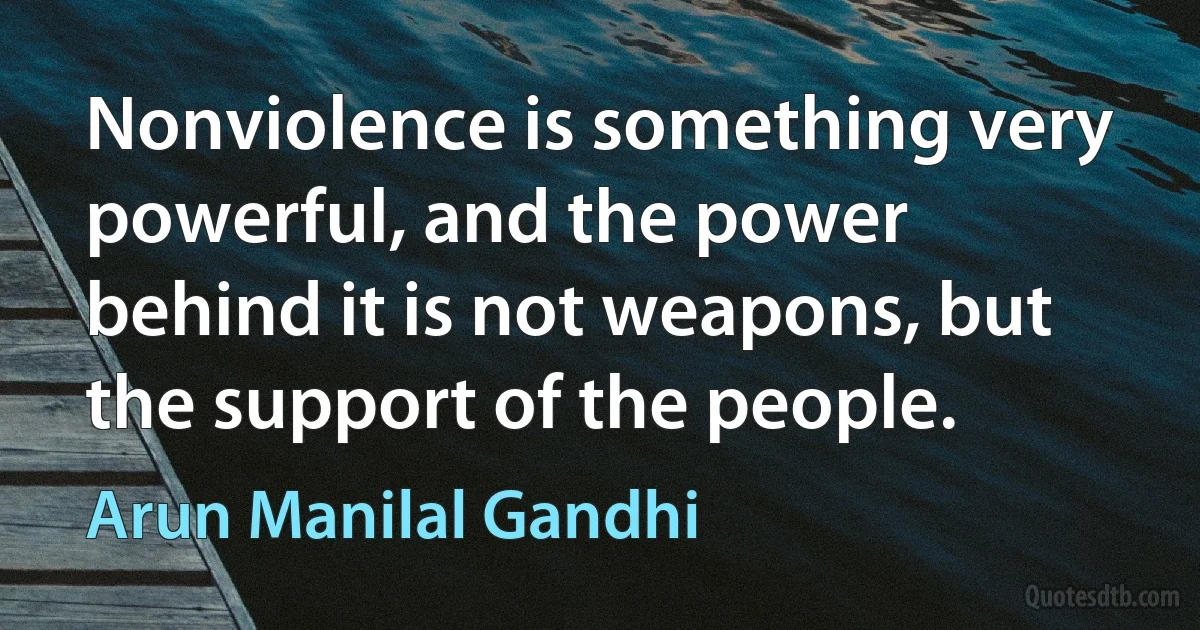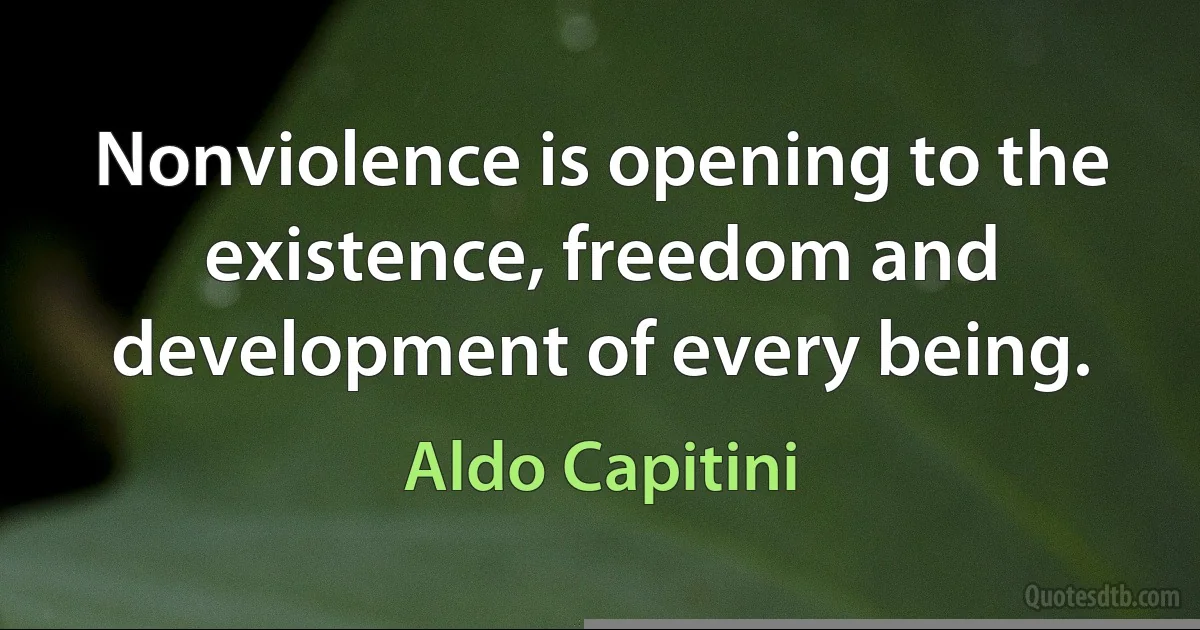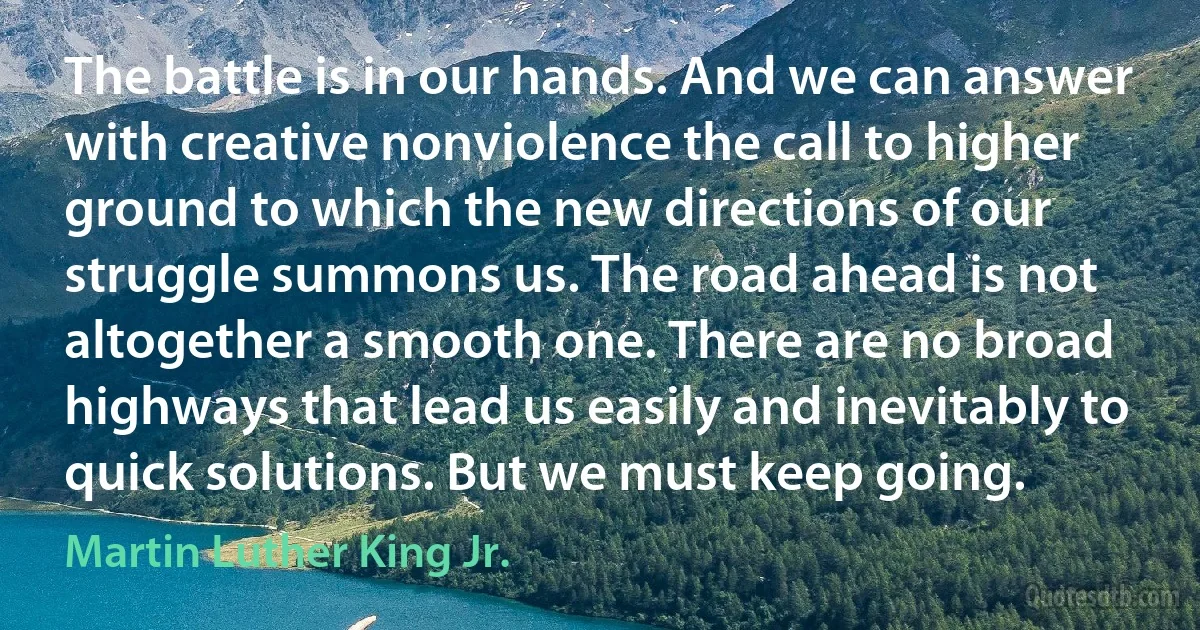Nonviolence Quotes - page 2
Dr. King was also radical in his beliefs about violence. He learned how to successfully fight hatred and violence with the unstoppable power of nonviolence.
He once stopped an armed mob, saying: "We are not advocating violence. We want to love our enemies. I want you to love our enemies. Be good to them. This is what we live by. We must meet hate with love."

Cesar Chavez
This is to warn you that I am no longer held in check from fighting white supremacists by Elijah Muhammad's separatist Black Muslim movement, and that if your present racist agitation against our people there in Alabama causes physical harm to Reverend King or any other black Americans who are only attempting to enjoy their rights as free human beings, that you and your Ku Klux Klan friends will be met with maximum physical retaliation from those of us who are not hand-cuffed by the disarming philosophy of nonviolence, and who believe in asserting our right of self-defense - by any means necessary.

Malcolm X
Government violence is not the result of violent revolutions, but the product of government itself. Any movement that leaves the State intact will fail in ending the oppressions we are fighting against. A nonviolent movement that replaces one government with another-and this is the greatest victory a nonviolent movement has ever achieved in the history of the world-ends up betraying itself, allowing Power to change its masks without addressing the fundamental problems of society. Nonviolence as an analytical tool has no means of understanding this kind of defeat-the kind that looks like victory.

Peter Gelderloos
Dr. King's policy was, if you are nonviolent, if you suffer, your opponent will see your suffering and will be moved to change his heart. That's very good. He only made one fallacious assumption. In order for nonviolence to work, your opponent must have a conscience. The United States has none.

Stokely Carmichael
The person who is dedicated to nonviolence is more active than anyone, because he does not only want to overcome indifference and hatred, weariness and egoism within himself, but he wants to overcome anything which divides and hurts all people and therefore the person dedicated to nonviolence does not accept society as it is.

Aldo Capitini
You carry the weapon. That's how they don't see it coming. You're the one. They talk about 'color blind or blind to your color.' You said it yourself. You don't send the Black Liberation Army into Wall Street to conduct an action. You don't send the American Indian Movement into downtown Seattle to conduct an action. Who do you send? You. With your beard shaved, your hair cut close and wearing a banker's suit. There's probably a whole lot more to it, you know that, but there is where you start. Who carries the front-end? Why is it always people of color carrying the weight on this, when people who are much more proximate in terms of acceptability to the centers of power, professing solidarity and principled nonviolence on the one hand, and critiquing the practice of those who are carrying the weight on the other. Why is that?

Ward Churchill
The Gandhian influence dominated freedom struggles on the African continent right up to the 1960s because of the power it generated and the unity it forged among the apparently powerless. Nonviolence was the official stance of all major African coalitions, and the South African A. N. C. remained implacably opposed to violence for most of its existence.

Nelson Mandela
Gandhi remained committed to nonviolence; I followed the Gandhian strategy for as long as I could, but then there came a point in our struggle when the brute force of the oppressor could no longer be countered through passive resistance alone. We founded Umkhonto we Sizwe and added a military dimension to our struggle. Even then, we chose sabotage because it did not involve the loss of life, and it offered the best hope for future race relations. Militant action became part of the African agenda officially supported by the Organization of African Unity (O. A. U.) following my address to the Pan-African Freedom Movement of East and Central Africa (PAFMECA) in 1962, in which I stated, "Force is the only language the imperialists can hear, and no country became free without some sort of violence."

Nelson Mandela
In the past ten years unarmed gallant men and women of the United States have given living testimony to the moral power and efficacy of nonviolence. By the thousands, faceless, anonymous, relentless young people, black and white, have temporarily left the ivory towers of learning for the barricades of bias. Their courageous and disciplined activities have come as a refreshing oasis in a desert sweltering with the heat of injustice. They have taken our whole nation back to those great wells of democracy which were dug deep by the founding fathers in the formulation of the Constitution and the Declaration of Independence. One day all of America will be proud of their achievements.

Martin Luther King Jr.
I experience this high and joyous moment not for myself alone but for those devotees of nonviolence who have moved so courageously against the ramparts of racial injustice and who in the process have acquired a new estimate of their own human worth. Many of them are young and cultured. Others are middle aged and middle class. The majority are poor and untutored. But they are all united in the quiet conviction that it is better to suffer in dignity than to accept segregation in humiliation. These are the real heroes of the freedom struggle: they are the noble people for whom I accept the Nobel Peace Prize.

Martin Luther King Jr.
Nonviolence in the civil rights struggle has meant not relying on arms and weapons of struggle. It has meant noncooperation with customs and laws which are institutional aspects of a regime of discrimination and enslavement. It has meant direct participation of masses in protest, rather than reliance on indirect methods which frequently do not involve masses in action at all.
Nonviolence has also meant that my people in the agonizing struggles of recent years have taken suffering upon themselves instead of inflicting it on others. It has meant, as I said, that we are no longer afraid and cowed. But in some substantial degree it has meant that we do not want to instill fear in others or into the society of which we are a part. The movement does not seek to liberate Negroes at the expense of the humiliation and enslavement of whites. It seeks no victory over anyone. It seeks to liberate American society and to share in the self-liberation of all the people.

Martin Luther King Jr.



